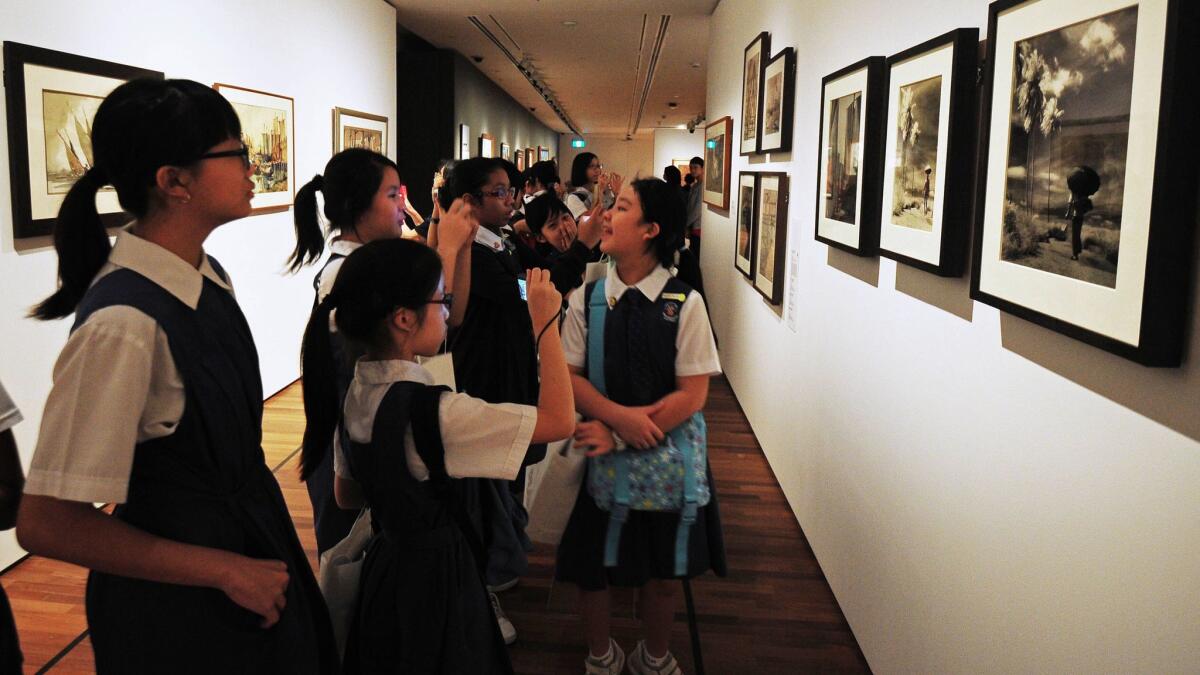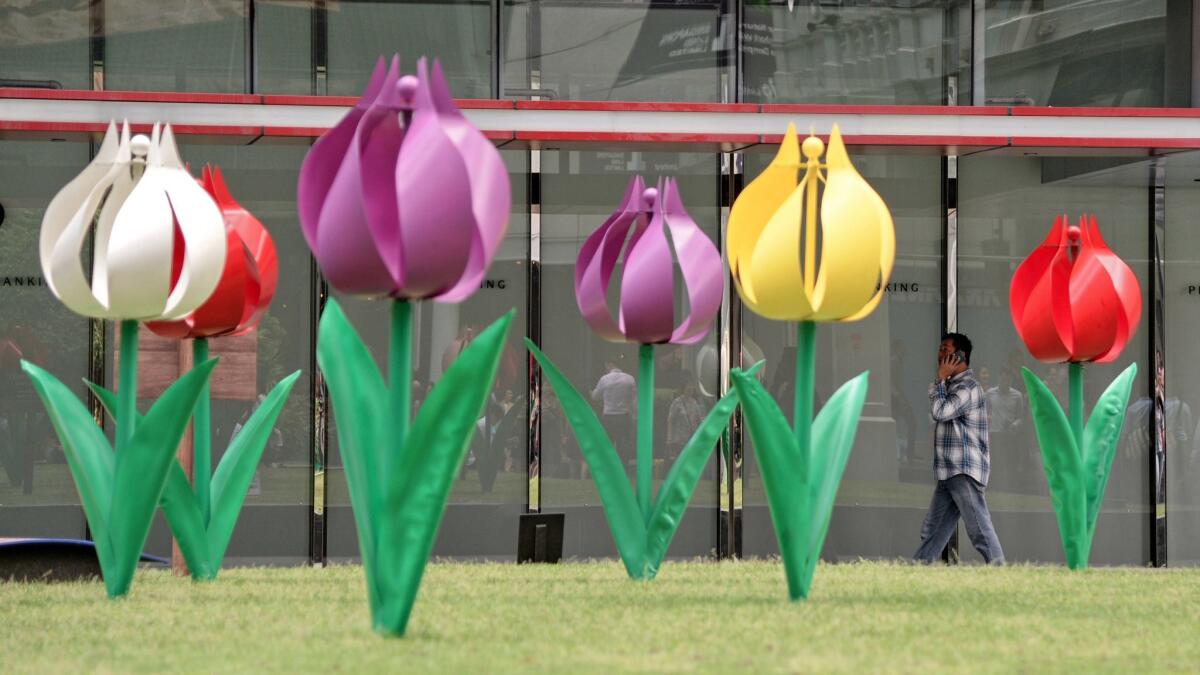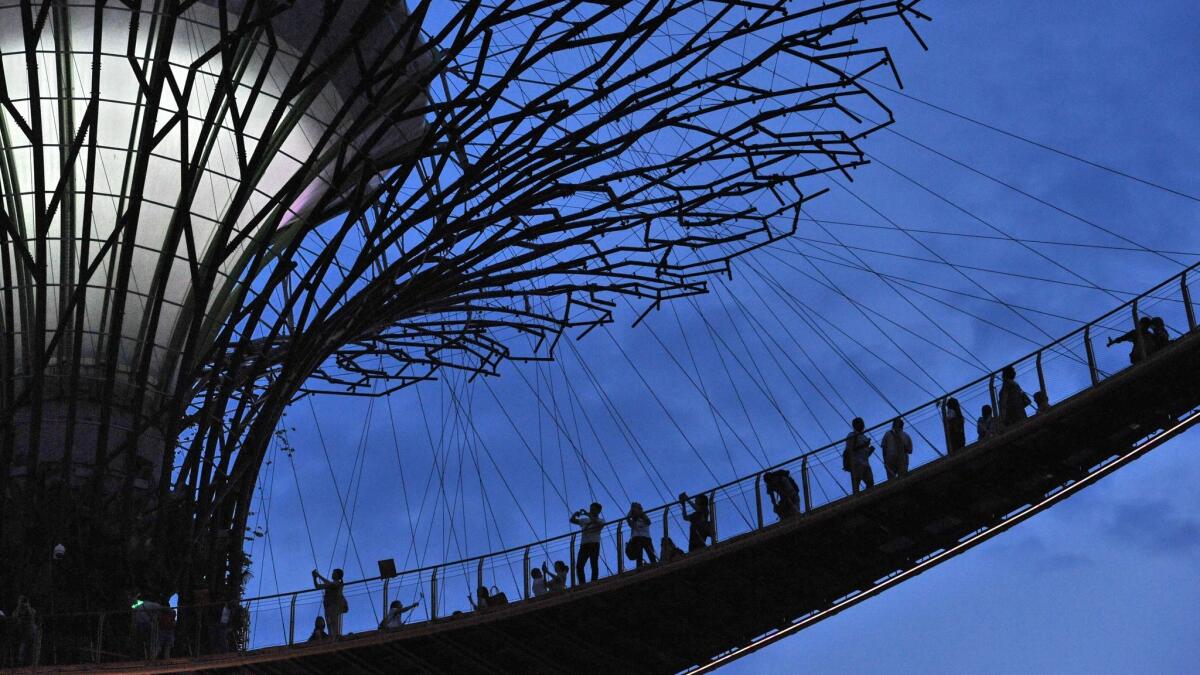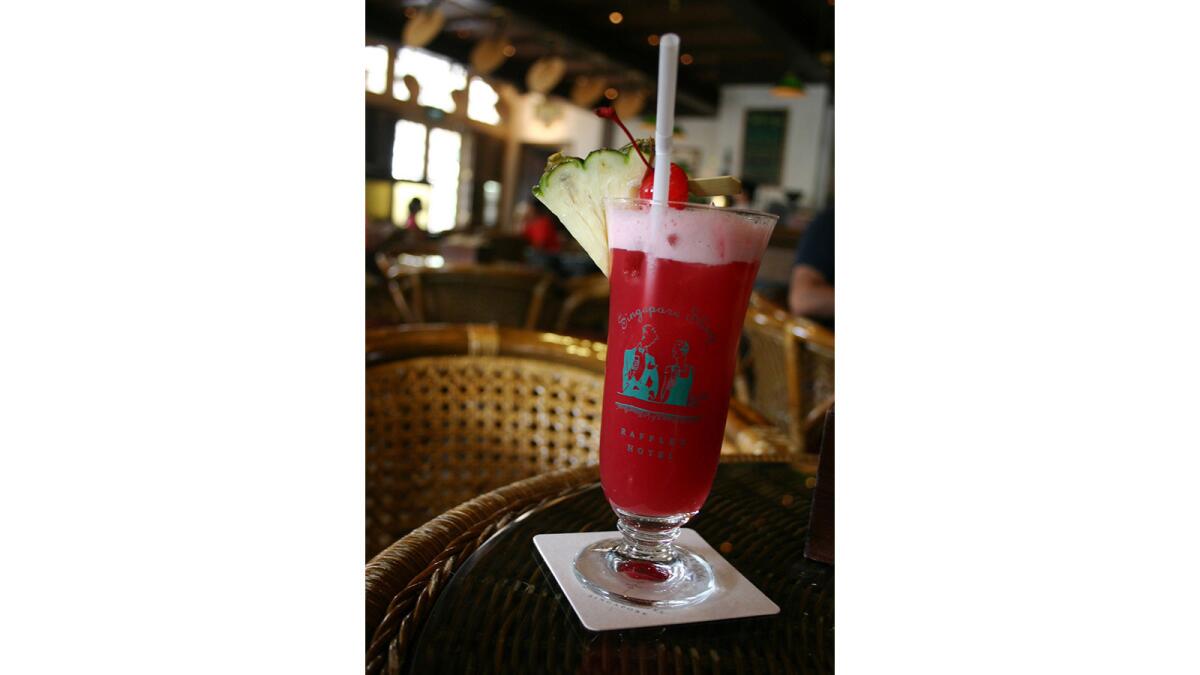Singapore always surprises
Reporting from Singapore â Yes, itâs a tourist trap. Yes, I had to queue up in a long, steamy line to reach the bar. And yes, I paid $50 for a couple of drinks.
But Iâm a traditionalist. And skipping a Singapore Sling here would be akin to snubbing scotch in Scotland, Cognac in France or vodka in Russia.
So I waited my turn, took a seat in the storied Long Bar at Raffles Hotel and ordered the pretty pink drink that bartender Ngiam Tong Boon concoted 101 years ago. As the tale is told, the Rafflesâ mixologist created the fruit-juicy cocktail for ladies, mixing gin with pineapple and lime juices, grenadine, Benedictine, cherry brandy and Cointreau.
It still looks â and tastes â like spiked fruit juice, and the Long Bar, a clubby-looking dark mahogany space, adds just the right amount of colonial-cool atmosphere to complete the illusion. I was transported to another place and time.
Surprisingly, it was well worth the wait and hassle.
Singapore is like that: always surprising visitors.
The wealthy island city-state, off southern Malaysia, has attracted a lot of attention, not all of it good, since gaining independence from Britain in 1963. Its rigid laws and heavy penalties for minor infractions â you can be fined $500 for dropping gum â sometimes make it the butt of international jokes.
Despite this, it has thrived on high-tech industry, financial services and the success of its busy port. And tourism has become increasingly important to the economy.
The multicultural background of its residents, diverse cuisines and outstanding airport, which is often called one of the best in the world, have made it a prime Southeast Asia tourist destination, drawing more than 15 million annually.
Now the city has more to brag about. Besides being applauded for its head-turning architecture, Singaporeâs new National Gallery houses the worldâs largest public display of modern Southeast Asian art, showcasing a vast collection of 19th and 20th century works.
Singaporeâs reinvention from colonial backwater to high-tech art center didnât come cheaply: It took the government 10 years and $375 million to build what CNN calls âThe Louvre of Southeast Asia.â
When I visited Singapore earlier this year, the new showplace ranked high on my list of must-sees. But like many travelers, I have eclectic interests and was also eager to visit the cityâs fantastic gardens, Little India and Chinatown. And do some tippling at the legendary Long Bar.
The National Gallery

My first stop was the National Gallery, which is housed in two historic neoclassical buildings, the former Supreme Court and City Hall, where the Japanese surrendered in World War II.
Paris-based architects Studio Milou joined the buildings by adding a filigreed roof with glassed-in areas and canopies that create a light-filled four-floor atrium. Modified catwalks link the two buildings, and rooftop gardens add a place to view the city.
The result is visually spectacular: the two colonial buildings restored and unified to create a state-of-the-art museum.
Inside, galleries house more than 8,000 modern Singaporean and Southeast Asian works, spanning years, techniques and artistic movements.
The art tells a lot about the island: There are colonial prints and botanical paintings, animals, abstractions, fish markets, old Malay villages and an 1849 wall-sized painting by Raden Saleh called âForest Fireâ that depicts a frenzied scene of tigers at the edge of a precipice as the jungle blazes behind them.
When the museum opened in November 2015, Singaporeâs prime minister, Lee Hsien Loong, told guests that he hoped the new gallery would help the city-state become dedicated to culture in the same way that other great cities such as New York, Paris and London are dedicated.
âI hope that through the many exhibitions and activities ... we will discover new perspectives of who we are,â he said.
Singaporeâs goal for the first five decades of its existence was to become a commercial success; its new goal, experts say, is to become a creative success. The National Gallery is a major step along that path.
The Garden City

They call Singaporeâs Gardens by the Bay a world of wonders. And the âsupertreesâ found there definitely fit that description.
The city-state, sometimes called Garden City because of the abundance of trees planted along its avenues, raised the bar a few years ago when it added colossal, solar-powered supertrees to its skyline. The mechanical trees, erected by the National Parks Board, are unique.
Eighteen man-made trees make up the forest, soaring to heights of 82 to 160 feet. All are part of the 250-acre Gardens by the Bay landscaping project. Singapore calls the trees vertical gardens, but their real purpose is to generate solar power, act as venting ducts and collect rainwater.

The supertrees might be the most visible aspect of Gardens by the Bay, but theyâre not the key attractions. Two huge, air-conditioned conservatories are the main draw here, places where visitors can escape Singaporeâs steamy heat.
You can walk among 1,000-year-old olive trees and other Mediterranean-climate plants in the Flower Dome or hike to the top of a 115-foot-tall waterfall amid ferns, orchids and other rainforest plants in the Cloud Forest. It might be hot outside, but itâs cool inside the domed conservatories.
If you prefer more natural gardens, donât miss the sprawling grounds of the Singapore Botanic Gardens, which became the countryâs first UNESCO World Heritage Site in 2015.
The gardens, founded in 1859, were landscaped in an English style and resemble British pleasure gardens and parks. This layout has survived the passage of time, and the park is also dotted with many historical buildings.
The most colorful part of the park is the National Orchid Garden, which has more than 1,000 species and 2,000 hybrids on display.
One-of-a-kind orchids are named after visiting dignitaries and celebrities who have contributed to society, so you may see famous names on garden markers, such as the William and Catherine, the Duke and Duchess of Cambridge, as well as special guests such as South Africaâs late President Nelson Mandela and celebrities such as actor Jackie Chan.
How to make a Singapore Sling

If you visit the Raffles Hotel in Singapore in the near future, you might consider signing up for its Singapore Sling Masterclass, a one-hour demonstration that will give you the inside track on making this famous drink.
Otherwise, just try making it on your own.
- 1½ ounces gin
- ½ ounce Cherry Heering
- 1â4 ounce Cointreau liqueur
- 1â4 ounce Dom Benedictine
- 4 ounces pineapple juice
- 1â2 ounce lime juice
- 1â3 ounce grenadine
- 1 dash bitters
- Shake with ice.
- Strain into an ice-filled Collins glass.
- Garnish with cherry and slice of pineapple.
If you go
THE BEST WAY TO SINGAPORE
From LAX, Singapore Airlines offers nonstop service to Changi Airport, and Singapore, JAL, Cathay Pacific, All Nippon, United, Delta, Air China, EVA, Emirates, China Airlines, Qatar, Etihad, Qantas, British and China Southern offer connecting service (change of planes). Restricted round-trip airfares begin at $1,235, including taxes and fees.
TELEPHONES
To call the numbers below from the U.S., dial 011 (the international dialing code). 65 (the country code for Singapore) and the eight-digit local number.
WHERE TO STAY
Capella Singapore, 1 the Knolls, Sentosa Island, Singapore; 6591-5033. Standout views and colonial charm are highlights at this luxury hotel on recently revitalized Sentosa, a 30-acre island off southern Singapore. Capella, set on a hill overlooking the South China Sea, is a mix of modern and colonial buildings with well-landscaped grounds, two infinity pools, four dining venues and large, plush rooms. Doubles from $721 a night.
Raffles Hotel, 1 Beach Road, Singapore; 6337-1886. This iconic hotel draws lines of tourists daily. Look past the chaos to find a genteel showplace reflecting the British colonial era. Only guests can access the inner reaches of the hotel, where comfortable rooms with high ceilings are filled with charm and antique furniture. Doubles from $654 a night.
Carlton Hotel Singapore, 76 Bras Basah Road, Singapore; 6338-8333. Centrally located high-rise hotel has multiple towers with great views and offers a good buy for the money. Modern, understated rooms are comfortable and efficient. Doubles from $183 a night.
WHERE TO EAT
The Banana Leaf Apolo, 54 Race Course Road, Singapore; 6293-8682. Canât decide whether to have tapas, Thai, Indian or Mediterranean cuisine? This vintage Indian restaurant, founded in 1974, has it all and is one of the cityâs most popular diners. Entrees from $7.
Sky on 57, Sands SkyPark,10 Bayfront Ave., Singapore; 6688-8857. Celebrity chef Justin Quekâs restaurant, atop the eye-popping Marina Bay Sands hotel, is pricey, but the view and the fusion menu are worth it. (Or save money and just have cocktails, but the minimum bar charge is $21.) Best bet: Time your visit to arrive before sunset. Entrees start at $40 and top out at $130 for a sirloin.
Brewerkz, 30 Merchant Road, Singapore; 6438-7438. For a taste of home, youâll find pizzas, burgers, fries, nachos, buffalo wings and dozens of brews to help you cool off on a hot Singaporean evening. Four locations. Burgers from $14.75.
TO LEARN MORE
LAWS TRAVELERS SHOULD KNOW ABOUT
Most visitors are impressed by Singaporeâs physical appearance: No graffiti, no trash, no homeless asking for a handout.
Strict laws keep it that way. As my guide said, âI donât break the law, and I donât like people who do. So why should I care if the laws are strict?â
But some laws are surprising. For instance, feeding pigeons could result in a costly fine, and selling gum could land you in jail for two years, according to Singapore Statutes Online.
Hereâs a look at some other things you shouldnât do when you visit â and possible penalties, as compiled by the U.S. State Department.
- Always carry your passport with you. You may be taken in for questioning if you donât.
- Jaywalking, littering or spitting can result in arrest.
- Vandalism offenses draw mandatory caning.
- Immigration violations can result in imprisonment, caning or fines.
- Sex crimes, or sexually inappropriate behavior, including making lewd comments to women who find it offensive, may result in fines or imprisonment.
- Drug-related charges draw severe penalties, including the death penalty or caning.
- Carrying firearms, or committing crimes with firearms, draw strict penalties.
ALSO
A weekend in Hemet offers more than just another fish story
These three Utah ski resorts arenât just for locals anymore. Hereâs why they will intrigue you
New hotels, hot restaurants, a singing superstar â Vegas proves again it just never sits still
Sign up for The Wild
Weâll help you find the best places to hike, bike and run, as well as the perfect silent spots for meditation and yoga.
You may occasionally receive promotional content from the Los Angeles Times.



